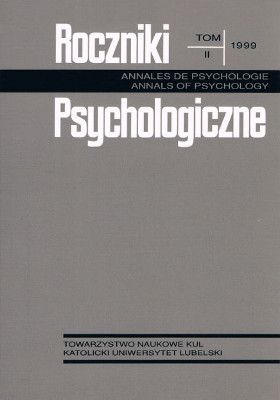The Personal Attitude of Faith: a Model of the Qualitative Analysis
Abstract
The problems of faith are taken as one of the basic attitudes in life not only in the recent encyclical Fide et ratio by John Paul II, but also in numerous other publications written by the authorities of contemporary psychology. What they stress in particular is that the attitude of faith adequately develops and grow as the interpersonal relations become more profound, mutual confidence in the reliability of a dialogue with other persons is reinforced and there is an openness to experience life events in all the three dimensions of time. The attitude of faith becomes an integral personal style to adopt a position in life and take an active part with others in life events. This is accompanied by a sense of confidence in the rationality of moral norms, a readiness to seek truth with a belief in human common sense and a conviction about the primary value of life and its developmental capacities. Now, religious faith may develop in the climate of that attitude and it is grounded on a reliable personal testimony of one's direct or indirect dialogue with God, as a person with a person. In this context it has been particularly stressed how significant it is to refer religious faith, and ground it, on the reliability of the testimony and works of Jesus Christ as a Mediator between man and the Totally Different, transcendent God.
The structural qualitative analysis of the personal attitude of faith may constitute a foundation on which to grasp the elements of a reductionistic approach to the manifestations of religious faith. This is especially important when the meaningful dialogal and personal relations are omitted and they are treated merely as manners in which to deal with the subconscious mechanisms of irrational wishes and fears. In the dialogal interpersonal relations one may reasonably give credence to the internal coherence and rationality of the attitude of faith, submitting it to a systematic analysis according to the proposed model procedure.
References
Frankl V. E. (1948). Der unbewuste Gott. Wien (Nieuświadomiony Bóg. Warszawa 1978: IW PAX).
Frankl V. E. (1971). Homo patiens. Warszawa: IW PAX.
Freud Z. (1927). The future of an illusion. New York: Liveright Publishers.
Fromm E. (1950). Psychoanalysis and religion. New Haven: Yale University Press.
Fromm E. (1994). Niech się stanie człowiek. Z psychologii etyki. Warszawa: PWN.
James W. (1958). Doświadczenia religijne. Warszawa: KiW.
Jan Paweł II, papież. (1998). Fides et ratio. O relacjach między wiarą a rozumem. Encyklika. Tarnów: Biblos-Dokumenty.
Kinget G. M. (1975). On being human: A systematic view. New York: Harcourt Brace Jovanovich.
Maslow A. H. (1959). Critique of self-actualization. Some dangers of Being-Cognition. Journal of Individual Psychology, 15, 1, 24-32.
Maslow A. H. (1966). Comments on dr. Frankl's Paper. Journal of Humanistic Psychology, 6, 1, 107-112.
Maslow A. H. (1970). Religions, values, and peak-experiences. New York: The Viking Press.
Maslow A. H. (1971). The farther reaches of human nature. New York: The Viking Press.
May R. (1973). Paulus – Reminiscens of a friendship. New York.
May R. (1995). O istocie człowieka. Szkice z psychologii egzystencjalnej. Poznań: Dom Wydawniczy REBIS.
Milanesi G., Aletti M. (1973). Psicologia della religione. Torino: Elle di Ci.
Perls F. S. (19748). Gestalt therapy verbatim. Moab, Utah: Real People Press.
Strojnowski J. (1999). Siostra od miłosierdzia. Charaktery, 4 (27), 40-42; por. Spory i roztrząsania. Charaktery, 1999, 6 (29), 40-41.
Tillich P. (1969). Religion as a dimension in man's spiritual life. W: J. D. Bettis (red.), Phenomenology of religion. New York: Harper and Row, Publishers, s. 173-178.
Tillich P. (1983). Męstwo bycia. Paris: Éditions du Dialogue.
Uchnast Z. (1994). Reinterpretacja założeń psychologii postaci: od modelu całości jako symbolicznej figury do modelu całości naturalnej jako ekosystemu. Roczniki Filozoficzne, 42, 4, 30-69.
Vergote A. (1967). Psychologia religiosa. Torino: Borla Editore.
Copyright (c) 1999 Roczniki Psychologiczne

This work is licensed under a Creative Commons Attribution-NonCommercial-NoDerivatives 4.0 International License.


